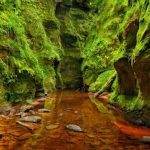 History
History  History
History  Health
Health 10 Everyday Activities That Secretly Alter Consciousness
 History
History Top 10 Historical Disasters Caused by Someone Calling in Sick
 Animals
Animals 10 New Shark Secrets That Recently Dropped
 Movies and TV
Movies and TV 10 Forgotten Realities of Early Live Television Broadcasts
 Technology
Technology 10 Stopgap Technologies That Became Industry Standards
 Weird Stuff
Weird Stuff 10 Wild Facts About Taxidermy That You Probably Didn’t Know
 Travel
Travel 10 Beautiful Travel Destinations (That Will Kill You)
 Miscellaneous
Miscellaneous 10 Modern Marriage Rituals Born from Corporate Branding
 Weird Stuff
Weird Stuff Ten Bizarre Visions of 2026 from Fiction
 History
History 10 “Modern” Problems with Surprising Historical Analogs
 Health
Health 10 Everyday Activities That Secretly Alter Consciousness
 History
History Top 10 Historical Disasters Caused by Someone Calling in Sick
Who's Behind Listverse?

Jamie Frater
Head Editor
Jamie founded Listverse due to an insatiable desire to share fascinating, obscure, and bizarre facts. He has been a guest speaker on numerous national radio and television stations and is a five time published author.
More About Us Animals
Animals 10 New Shark Secrets That Recently Dropped
 Movies and TV
Movies and TV 10 Forgotten Realities of Early Live Television Broadcasts
 Technology
Technology 10 Stopgap Technologies That Became Industry Standards
 Weird Stuff
Weird Stuff 10 Wild Facts About Taxidermy That You Probably Didn’t Know
 Travel
Travel 10 Beautiful Travel Destinations (That Will Kill You)
 Miscellaneous
Miscellaneous 10 Modern Marriage Rituals Born from Corporate Branding
 Weird Stuff
Weird Stuff Ten Bizarre Visions of 2026 from Fiction
10 Creepy Sunken Man-Made Objects
Thalassophobia is the relatively well-known fear of deep bodies of water, but a slightly more niche water-related phobia is submechanophobia, which is a fear of submerged man-made objects. There’s something deeply unsettling about the fact that these objects—be they small statues or large buildings—are underwater where they don’t belong. Plus, over time, aquatic life takes over, and the object starts to decay, which only adds to the eerie look. Here are 10 of the creepiest sunken man-made objects.
Related: 10 Reasons to Stay Away from Large Bodies of Water
10 The Sunken Cemetery
In 1871, Mount Hibok-Hibok on Camiguin Island in the Philippines cracked open and started spewing lava. The violent volcanic eruption led to the creation of Mount Vulcan. However, it also led to the nearby town falling into the ocean, along with its cemetery.
A huge commemorative cross in the sea now marks the spot where the drowned town came to lie. Visitors can view the cross from the shore, take a short boat trip out to the platform for an up-close experience, or even go snorkeling to see the remains of the graves beneath the waves. The dive isn’t a deep one, but the sight of the gravestones—many of which are in the shape of crosses—eerily resting on the seabed is sure to send a shiver down anyone’s spine.[1]
9 Ogopogo Statue
A sinister statue lurks at the bottom of Okanagan Lake in British Columbia, Canada. According to Canadian folklore, a serpent-like cryptid called Ogopogo, aka N’ha-a-itk, lives in the lake. Although the existence of the legendary aquatic creature—which looks similar to Scotland’s Loch Ness monster—is yet to be proven, there is a statue of Ogopogo in the lake.
The statue has been there since the early 1990s, and Diving Dynamics offers guided tours to see the beast, which is 8 feet (2.5 meters) tall, 14 feet (4 meters) long, and anchored 30 feet (9 meters) below the surface. Doug Lundgren at Diving Dynamics says that because “the visibility is about 10 or 12 feet, [the scuba divers] are looking down, and all of a sudden, they see this green shadow, and their eyes just become dinner plates.”
Ogopogo isn’t the only thing lurking in the lake—there’s also a 1950s milk truck, a railway barge, and various steamboats and power boats.[2]
8 The Statues of Jason deCaires Taylor
Artist Jason deCaires Taylor has carved out a niche for himself in the world of underwater sculptures, with hundreds of his creations being submerged in oceans across the world. Many of his sculptures can be found at underwater sculpture parks and museums, such as those just off the coast of Grenada and Cannes. All of his creations are environmentally friendly, having been designed to encourage the growth of coral, algae, and other sea life.
The majority of his designs are modeled after humans, which makes them extra creepy as the sea starts to eat away at their faces. A gallery of his works can be found online. Two of his most unsettling creations are “The Listener,” which is a human figure entirely covered in ears, and “Holy Man,” another human figure but this time riddled with holes and filled with coral.[3]
7 C-130 Hercules Aircraft
The Gulf of Aqaba, at the Northern end of the Red Sea, has great visibility, and as a result, it’s a hot spot for divers. The Aqaba Marine Park has many dive sites, including deliberately sunk tanks and helicopters. Located near an M42 tank and the wreck of a ship called the Cedar Pride lies a massive C-130 Hercules aircraft. Although ships aren’t supposed to be on the seabed, the water is at least their usual environment; planes, on the other hand, look completely out of place beneath the waves.
The C-130 was purposely sunk in 2017 with the intention of creating an artificial reef for sea life. The plane is around 98 feet (30 meters) long and has a wingspan of 131 feet (40 meters). Divers can enter both the cargo bay and the cockpit. Although mostly empty, a plastic skeleton wearing a flight suit and helmet was placed in the cockpit.
In 2020, the plane was significantly damaged during a storm. The wings broke off, and the body was ripped into two pieces, but this merely adds to the eerie look of the craft.[4]
6 Kőbánya Mine
Below the streets of Budapest, Hungary, is a flooded limestone mine. From the Middle Ages onward, around 3.5 million cubic feet (1 million cubic meters) of limestone was excavated from the Kőbánya mine to construct the buildings above. Mining stopped in 1890, but the space was still used by brewers and winemakers, who fermented their alcoholic drinks down there. The chambers were also used as bomb shelters during World War II.
The mine then flooded with groundwater during the 1990s and, soon afterward, opened to recreational divers. There are four dive sites, three of which require an advanced diving certificate, but the fourth is open to those with basic qualifications thanks to air pockets in the chambers. Those brave enough to descend into the dark hallways and chambers can see the creepy mining machinery that was left behind.[5]
5 The SS President Coolidge
The Titanic may be the most famous sunken ship in the world, but given that the wreck lies in the middle of the Atlantic at a depth of 12,500 feet (3,800 meters), it’s not exactly accessible. The largest sunken ship that is accessible is the SS President Coolidge—a luxury ocean liner that was used as a troop carrier during World War II and measures 653 feet (200 meters) in length. The Coolidge met its end when it accidentally struck friendly mines while sailing into the harbor at Espiritu Santo, Vanuatu.
The wreck of the Coolidge is located close to the shore and sits at a depth of 65–230 feet (20–70 meters). Now covered in a layer of sea life, divers can swim through the ship’s decks and holds to see the various military and luxury objects that were left behind. Along with guns and cannons, there are also opulent chandeliers and a mosaic tile swimming pool. Due to the wreck’s enormous size, there are around 40 unique dives that can be done to see the entire ship.[6]
4 The Ship Graveyard of Chuuk Lagoon
If just one shipwreck isn’t enough for you, how about a seabed littered with wrecks? In 1944, Chuuk Lagoon—previously known as Truk Lagoon—in Micronesia was the site of Operation Hailstone, which saw U.S. fighter planes bomb Japanese warships.
Chuuk is now a popular dive site, with the grizzly remains of around 60 wrecks—some of which contain the remains of people who died during the battle—resting on the lagoon floor. People swimming through the eerie ships can see huge barnacle-covered deck guns, tanks, and cars, as well as smaller—but still creepy—items like gas masks and medicine bottles.
The sea water is slowly but surely corroding the ships, and without intervention to preserve the structures—which many people are in support of—they’ll eventually crumble away.[7]
3 A Shark Statue
Sharks aren’t typically on the minds of anyone swimming in a lake, but at the bottom of Neuchâtel Lake in Switzerland, a horrifying statue of a shark is waiting to greet divers. The shark is around 20 feet (6 meters) long and wears a huge toothy grin. Although it looks a bit cartoony on second glance, for anyone not expecting to see a shark down there, it’s a total jump scare.
Sleuths on Reddit managed to track down the origin of the shark. It was used as a prop in a short film called Choc au Lac!, where it looks far more silly than scary. It’s thought that the shark was left in the lake after filming wrapped, and over time, the lake has eaten away at the paint, making the shark look a lot more sinister.
Neuchâtel is also home to a few other strange underwater terrors, including a metallic dragon sculpture, a model lunar lander, and a statue of a dog.[8]
2 Titan I Nuclear Missile Silo
During the Cold War, the U.S. government built underground missile silos across the country, many of which have since been abandoned. One such silo in Warden, Washington, flooded during the 1960s after the pumps were turned off, offering a uniquely creepy experience for divers.
An advanced diving certificate is required to enter the silo due to it being a deep dive—the bottom of the silo is 110 feet (33 meters) down—and a night dive. Divers access the site through a tube that protrudes from a hole in the ground. From there, they enter a flooded concrete and steel world of tunnels, pipes, and cribwork. Although a fascinating slice of Cold War history, this dive isn’t for the faint of heart.[9]
1 Jason Voorhees Statues
Slasher icon Jason Voorhees is heavily linked to Camp Crystal Lake. It’s where he drowns in the original Friday the 13th film released in 1980. In 1986’s Part VI: Jason Lives, he’s even chained to the bottom of the lake. It seems only fitting then that someone would put a statue of the character at the bottom of a real lake. There have been at least two Jason Voorhees statues—complete with a hockey mask, of course—placed in lakes over the years.
In 2018, scuba diver Zachary Nagy put a Jason statue at the bottom of Lake Pleasant in Arizona. Everyone in the diving community there places a marker in the lake once they’re certified, so the lake is filled with unusual things—including Christmas trees and a scene of plastic skeletons playing poker. Unfortunately, the markers were later removed, with Lake Pleasant Regional Park supervisor David Jordan saying they needed “to maintain clean facilities for people to enjoy.”
However, the other well-known Jason statue is still hanging out in his watery grave. Since 2013, this Jason has been lurking at the bottom of a flooded iron ore pit in Minnesota, thanks to Friday the 13th fan Doug Klein. The dive site is home to many other objects, too, including a snowmobile and various plastic skeletons. There’s now even a Freddy Krueger statue down there to keep Jason company.[10]








